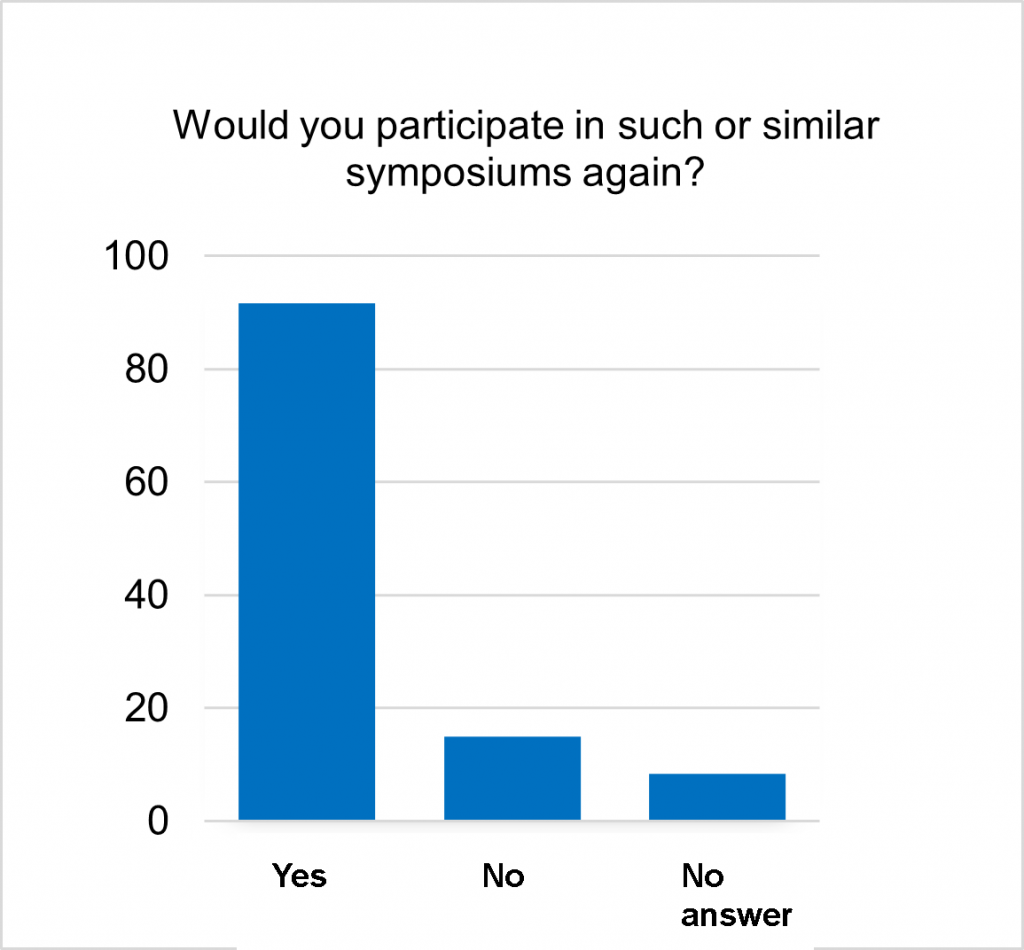The evaluation aimed at gaining an insight into which (positive) effects the symposium had on the participants in relation to the topic of refugees and immigrants in German schools. Not all symposium participants took part in the evaluation (81 out of 190 people). The results of the survey therefore represent a certain section of participants’ impressions.
The first question might be: “who were the participants anyway?”. The majority were school social workers (93%). This reflects the great practical relevance of the themes of refugees and immigrants in the school context. It seems as though the theme of the symposium plays a particularly important role in primary schools.
The vast majority of participants (92%) saw their expectations fulfilled in terms of content (see Fig. 2). Further, the participants expressed in the free fields of the evaluation survey that they feel more aware of the topics of exodus and migration, and have gained new perspectives and a better understanding. Moreover, participating school social workers stated that they felt vindicated and motivated with regard to their work. At the same time, it was critically noted that there is a lack of the required staff in their schools. They also said that the symposium had provided impetus for their own practical work, e.g. to respond more to pupils in class, to involve parents or to address multilingualism in the classroom as an enrichment. Those from a university background pointed to a broadening of their research perspectives. For some participants, the symposium clearly illustrated how important an exchange of and access to professional information on the topic is.

Selected quotes:
“I feel more aware.”
“I think I will take various aspects away with me. Firstly the relevance of school social work but also the importance of exchange and professionalism.”
“I will try to address and improve those things that I can influence in the right direction. I will seek out allies and continue to tweak at things, in particular to make the school feel like a ‘safe place’ for refugee children. Empathy and solidarity, steadfastness and political committee work are more important than ever.”
In connection with the experiences reported as being positive in many respects, several aspects of the symposium were described by participants as being beneficial:Practical relevance
– “interesting coupling of theory with empiricism”
– “Quality of the presentations”
– Variety of topics / different perspectives
– A “look beyond the horizon”; in particular, getting to know French and Danish approaches to dealing with multilingual students with refugee experience opened up new insights
– The poster presentations from the student projects
– The “very good structure and organisation”
– A “very friendly, appreciative and open atmosphere”
– The mutual (nationwide) exchange
According to the evaluation, more time could have been devoted to the students’ poster presentations. More time for exchange in the breakout rooms and a more intense dialogue with the speakers would also have been desirable. The proposals for change show that the (professional) exchange at the symposium was perceived as very appreciative and that this could be intensified.

Selected quotes:
“I especially liked the varied exchange, which allowed me to talk to other students as well as to professionals from practice all over Germany.”
“The different topics and the newly acquired impressions”
91% of the participants stated that they would attend such or similar symposiums again (Fig. 3). Overall, this reflects the positive experiences of the participants at the symposium, which at the same time contributed to an increased awareness of the topics of exodus and migration and to an increased motivation with regard to their own commitment to refugee children and young people in schools.
Selected quotes
“The theme is very topical and needs to be further developed.”
Recognition “that much remains to be done, but that progress has also been made”
